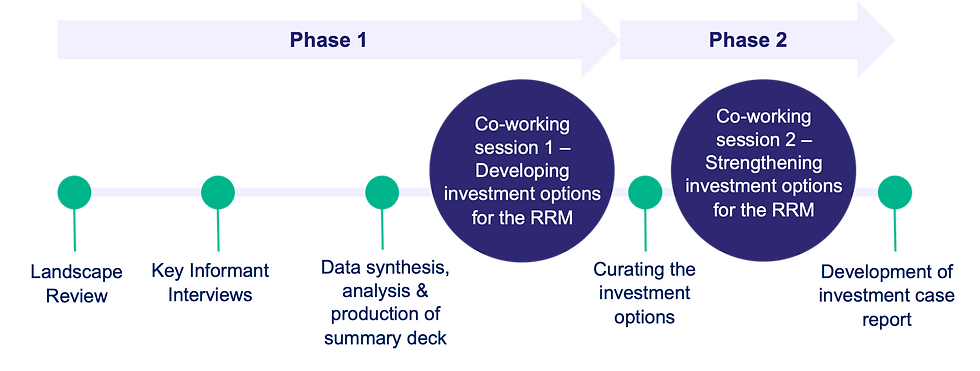FP2030 Rapid Response Mechanism consultancy
- Miraal Mavalvala

- Mar 15, 2022
- 2 min read
Updated: May 26, 2025
CONTEXT
As the FP2020 Partnership transitioned to FP2030 in 2021, significant changes were made to its governance structure. The Headquarter in Washington D.C. was dissolved, and five Regional Hubs were introduced in North, West & Central Africa; East & Southern Africa; Asia & the Pacific; Latin America & the Caribbean; and North America & Europe. The decentralized structure intends to drive country-led change that is tailored to the needs of communities. Crucial to the role of Regional Hubs would be a potential small-grants mechanism to fund family planning (FP) projects that would amplify FP progress within the regions.
To inform the way forward for a small-grants mechanism in the FP2030 Partnership, Impact for Health International conducted a review of the Rapid Response Mechanism (RRM), the small-grants mechanism of the FP2020 era that supported projects that responded to emerging and urgent opportunities that would help FP2020 meet its goal of enabling 120 million more women and girls to use contraceptives by 2020.
The aim of the review was to draw on the RRM’s achievements and lessons learned with the goal of developing an investment case for the inclusion of a small-grants mechanism within the Regional Hubs of the new FP2030 strategy.
OUR PROCESS
Impact for Health conducted the assignment over two-phases from May – July 2021. The assignment had two objectives:
To identify the key achievements and lessons learned from the FP2020 RRM with specific attention to the RRM’s grantmaking process (operational) and the five focus areas (programmatic) including: advocacy; costed implementation plan (CIP) development; increasing access to hard-to-reach groups including women and adolescents; strengthening health systems; and emergency preparedness and response.
To develop investment options (based on the key achievements and lessons learned) that leverage the RRM’s operational and programmatic modalities within regional hubs to advance the FP2030 vision.
Figure 1: Consultancy process overview

In Phase 1, we assessed the landscape of RRM projects by reviewing a representative sample of project grant reports across a diverse range of regions, grantee types and focus areas, as well as a review of RRM donor reports. Key informant interviews were conducted with a diverse pool of grantees, members of the FP2030 team and donor representatives to validate the RRM’s strengths and challenges from the perspective of the grantee and the grantor. Information from the review and interviews was synthesized to capture the RRM’s best practices in terms of operational and programmatic modalities.
At IHI, we believe in bringing our clients along the journey for critical decision-making through strategically facilitated workshops. These co-working sessions aim to bring out the best thinking in diverse groups to make strategy design more effective and collaborative. Hence, using the information from the review and interviews as an evidence base, we held a co-working session with FP2030 representatives to co-develop investment options for a future small-grants mechanism. In Phase 2, we curated the investment options and facilitated a second co-working session where IHI and FP2030 collectively strengthened the recommended option.
IHI was privileged to help support the terrific FP2030 team as they embark on the next decade of progress in Family Planning around the world that emphasizes country leadership, equity, and inclusion.
For more information on the new FP2030 Global Partnership, visit the link below.

Comments